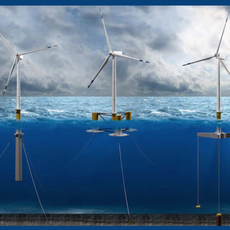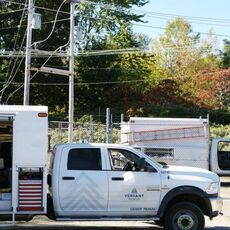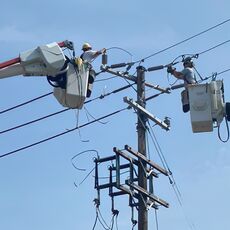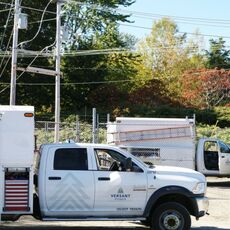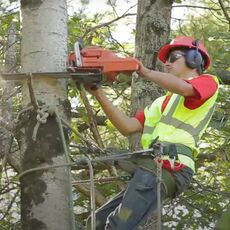Processing Your Payment
Please do not leave this page until complete. This can take a few moments.
- News
-
Editions
View Digital Editions
Biweekly Issues
- December 1, 2025
- Nov. 17, 2025
- November 03, 2025
- October 20, 2025
- October 6, 2025
- September 22, 2025
- + More
Special Editions
- Lists
- Viewpoints
-
Our Events
Event Info
Award Honorees
- Calendar
- Biz Marketplace
Energy & Utilities
-
Dead River Co. sues sibling managers over alleged trade secret violations
William Hall Updated: February 18, 2022The brother and sister, whose parents sold the family business to Dead River, went to work for the company and were promoted. The suit claims the siblings misappropriated information to start their own business over the past three months.
William Hall Updated: February 18, 2022State eyes concepts for developing Searsport as offshore wind hub
Laurie Schreiber Updated: February 15, 2022Four sites are eyed for manufacturing and deployment of floating foundations and turbines. Development costs range from $100 million to nearly $300 million. Certain areas would require blasting and dredging.
Laurie Schreiber Updated: February 15, 2022$90 utility credit could aid low-income Maine electricity customers
Staff February 10, 2022The $8 million proposal could help approximately 90,000 Maine households served by Central Maine Power and Versant Power. The supply rate rose over 80% this year.
Staff February 10, 2022Portland-based renewable energy company to expand into Millinocket
Laurie Schreiber February 7, 2022The expansion provides ORPC Inc. with a second Maine product development site, complementing a similar facility in Eastport.
Laurie Schreiber February 7, 2022Mills proposes bill aimed at improving accountability for Maine's electric utilities
Jessica Hall February 3, 2022Legislation unveiled by Gov. Janet Mills would create harsh penalties for substandard service by utilities, and could require the sale of their assets if they don't comply.
Jessica Hall February 3, 2022Bioplastics and equitable energy among goals of new UMaine seed grant awards
Staff February 2, 2022The program brings together University of Maine System experts with an interest in transdisciplinary work with other institutions and organizations to address societal or scientific questions.
Staff February 2, 2022Maine to receive an extra $55.2M in federal home energy assistance
Staff January 28, 2022Maine will get an additional $55.2 million in LIHEAP funds this year, more than doubling the state's typical annual funding.
Staff January 28, 2022SoPo’s mojo: Retail development takes off in South Portland
Renee Cordes Updated: January 24, 2022Retail development is booming in the state's fourth-largest city, from walkable waterfront neighborhoods to the sprawling shopping plazas of the Maine Mall area.
Renee Cordes Updated: January 24, 2022CMP seeks approval on settlement over solar connection problems
Jessica Hall January 12, 2022Central Maine Power agreed to invest $700,000 over the next two years to resolve complaints over solar project installation delays.
Jessica Hall January 12, 2022Clifton wind project gets $25M in financing
Sloane M. Perron, Worcester Business Journal January 3, 2022The loan, to a Massachusetts developer, will help complete a five-turbine wind-power facility in the Penobscot County town.
Sloane M. Perron, Worcester Business Journal January 3, 202220 Maine leaders offer New Year's resolutions for 2022
Renee Cordes Updated: January 3, 2022Maine business leaders from across their state share their lofty goals for the new year.
Renee Cordes Updated: January 3, 2022Gone but not forgotten: Remembering Mainers who died in 2021
Staff December 30, 2021Mainebiz reported the deaths of several notable Mainers during the past year, but we remember many more.
Staff December 30, 2021Some Versant Power customers to see rate increases
Staff December 28, 2021The change in transmission rates, effective Jan. 1, will increase an average electricity bill for certain residential customers by 56 cents per month.
Staff December 28, 2021Falmouth tree care company prunes residential business to grow utility services
Jessica Hall December 28, 2021Lucas Tree Experts has sold its lawn care and residential tree service division to a national company based in Ohio. Terms were not disclosed.
Jessica Hall December 28, 20213 Maine companies receive Governor's Awards for Business Excellence
Staff December 19, 2021The state has presented the awards annually since 1991 to recognize manufacturers and service companies for commitment to their communities and exemplary performance.
Staff December 19, 2021Maine receives $68.4M for water upgrades, stopping 'forever chemicals'
Staff December 16, 2021The state will use the money to improve wastewater treatment and to prevent pollution in drinking water by lead, arsenic and per- and poly-fluoroalkyl substances.
Staff December 16, 2021
Today's Poll
Sponsored by Kennebunk Savings Bank
The days after Thanksgiving are the traditional start of the holiday shopping season. Many shoppers are already setting their sights on the whirlwind of holiday shopping — Black Friday, Small Business Saturday and Cyber Monday.
Major retailers like Walmart, Target, Amazon and Best Buy have already launched early deals, giving shoppers a head start on savings.
A record 186.9 million people plan to shop from midnight on Black Friday through Cyber Monday, according to a consumer survey by the National Retail Federation. The figure is up by more than 3 million total shoppers from last year's record.
The National Retail Federation forecast also calls for holiday spending to surpass $1 trillion for the first time, with sales predicted to grow between 3.7% and 4.2% from 2024.

The Giving Guide
The Giving Guide helps nonprofits have the opportunity to showcase and differentiate their organizations so that businesses better understand how they can contribute to a nonprofit’s mission and work.
Learn More
Work for ME
Work for ME is a workforce development tool to help Maine’s employers target Maine’s emerging workforce. Work for ME highlights each industry, its impact on Maine’s economy, the jobs available to entry-level workers, the training and education needed to get a career started.
Learn More
Groundbreaking Maine
Whether you’re a developer, financer, architect, or industry enthusiast, Groundbreaking Maine is crafted to be your go-to source for valuable insights in Maine’s real estate and construction community.
Learn more-
The Giving Guide
The Giving Guide helps nonprofits have the opportunity to showcase and differentiate their organizations so that businesses better understand how they can contribute to a nonprofit’s mission and work.
-
Work for ME
Work for ME is a workforce development tool to help Maine’s employers target Maine’s emerging workforce. Work for ME highlights each industry, its impact on Maine’s economy, the jobs available to entry-level workers, the training and education needed to get a career started.
-
Groundbreaking Maine
Whether you’re a developer, financer, architect, or industry enthusiast, Groundbreaking Maine is crafted to be your go-to source for valuable insights in Maine’s real estate and construction community.
ABOUT
NEW ENGLAND BUSINESS MEDIA SITES
No articles left
Get access now
In order to use this feature, we need some information from you. You can also login or register for a free account.
By clicking submit you are agreeing to our cookie usage and Privacy Policy
Already have an account? Login
Already have an account? Login
Want to create an account? Register
This website uses cookies to ensure you get the best experience on our website. Our privacy policy
To ensure the best experience on our website, articles cannot be read without allowing cookies. Please allow cookies to continue reading. Our privacy policy
